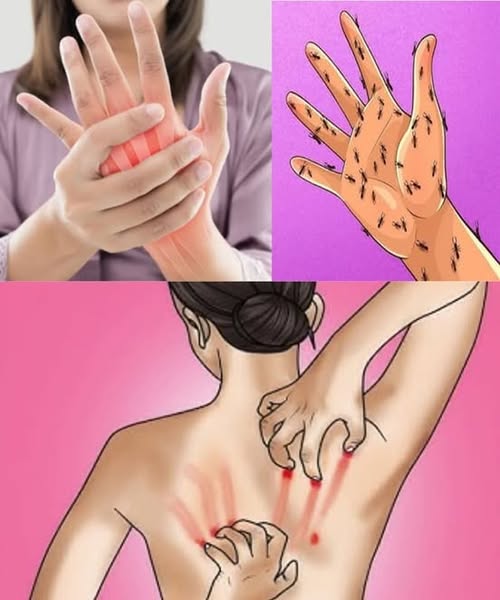Excess sugar in the body doesn’t always show up as weight gain — it often causes subtle but important physical symptoms. Here are 7 warning signs your body may be dealing with high sugar levels:

1. Tingling or Numbness in Hands and Feet
- Why it happens: High blood sugar can damage nerves over time, especially in the extremities — a condition called diabetic neuropathy.
- What to watch for: Burning, tingling, or aching sensations in your fingers or toes, especially at ni 2. Itchy Back or Skin
- Why it happens: Excess sugar can lead to poor circulation, skin dryness, or yeast overgrowth — all of which may trigger itchiness.
- You may feel especially itchy on the back, chest, or arms without a rash.
2. Sugar Cravings After Meals
- Why it happens: A high-sugar diet causes blood sugar spikes followed by sharp drops, triggering cravings for more sugar. It’s a vicious cycle.
- You may feel tired, hungry, and irritable soon after eating.
3. Frequent Urination
- Why it happens: The body tries to get rid of excess sugar through urine, which can lead to dehydration and increased thirst.
- You might also wake up at night needing to pee.
4. Unusual Fatigue
- Why it happens: Your cells become resistant to insulin and can’t absorb glucose efficiently, so you feel tired even after sleeping.
- You may also feel mentally foggy or unfocused.
5. Ants Are Attracted to Your Sweat or Urine
- Why it happens: When there’s too much sugar in your bloodstream, some of it is released through sweat and urine.
- If ants are gathering near your toilet, trash, or clothing, it could be a sign of excess glucose.
6. Slow Wound Healing
- Why it happens: High blood sugar damages blood vessels and reduces oxygen flow, slowing the skin’s ability to heal cuts or bruises.
- How to Reduce Sugar in Your Body Naturally
7. Cut Out Added Sugars
- Avoid soda, candies, pastries, and sweetened drinks.
- Read labels — even “healthy” products can contain hidden sugar (watch for words like sucrose, corn syrup, glucose 2. Eat More Fiber
- Fiber slows the absorption of sugar and helps regulate blood sugar.
- Eat more vegetables, chia seeds, oats, beans, and whole grains 3. Prioritize Protein and Healthy Fats
- They help you feel full and stabilize blood sugar.
- Examples: eggs, chicken, tofu, salmon, olive oil, avocado.
8. Exercise Regularly
- Physical activity helps muscles use glucose for energy, reducing blood sugar naturally.
- Aim for 30 minutes of walking, yoga, or strength training most days.
9. Drink More Water
- Water helps flush excess sugar from the bloodstream.
- Avoid fruit juices and sweetened drinks.
10. Sleep Well
- Poor sleep increases insulin resistance and sugar cravings.
- Aim for 7–8 hours of restful sleep per night.
When to See a Doctor
If you experience multiple symptoms or have a family history of diabetes, it’s important to check your blood sugar through a test. Early detection helps prevent long-term damage.




